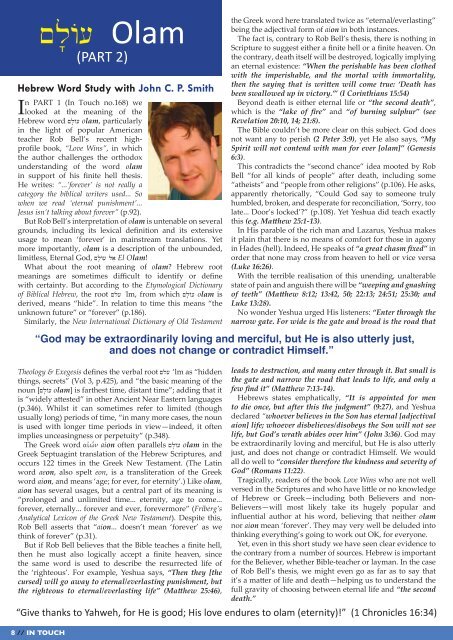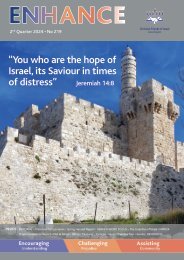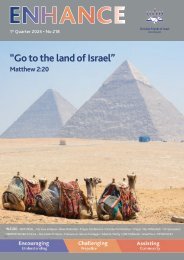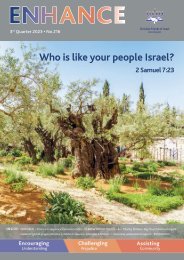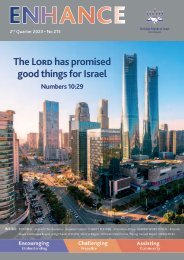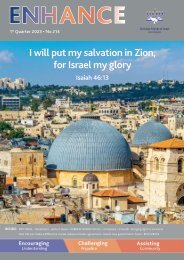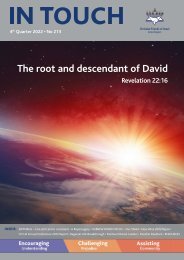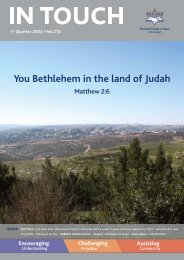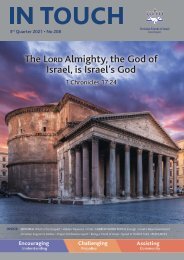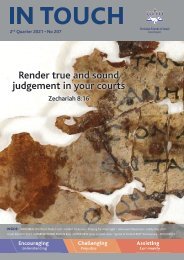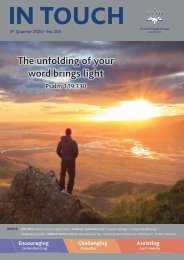You also want an ePaper? Increase the reach of your titles
YUMPU automatically turns print PDFs into web optimized ePapers that Google loves.
8 // IN TOUCH<br />
~l'A[ Olam<br />
(PART 2)<br />
Hebrew Word Study with John C. P. Smith<br />
<strong>In</strong> PART 1 (<strong>In</strong> <strong>Touch</strong> no.168) we<br />
looked at the meaning of the<br />
Hebrew word ~l'A[ olam, particularly<br />
in the light of popular American<br />
teacher Rob Bell’s recent highprofile<br />
book, “Love Wins”, in which<br />
the author challenges the orthodox<br />
understanding of the word olam<br />
in support of his finite hell thesis.<br />
He writes: “...’forever’ is not really a<br />
category the biblical writers used... So<br />
when we read ‘eternal punishment’...<br />
Jesus isn’t talking about forever” (p.92).<br />
But Rob Bell’s interpretation of olam is untenable on several<br />
grounds, including its lexical definition and its extensive<br />
usage to mean ‘forever’ in mainstream translations. Yet<br />
more importantly, olam is a description of the unbounded,<br />
limitless, Eternal God, ~l'A[ lae El Olam!<br />
What about the root meaning of olam? Hebrew root<br />
meanings are sometimes difficult to identify or define<br />
with certainty. But according to the Etymological Dictionary<br />
of Biblical Hebrew, the root ~l[ ‘lm, from which ~l'A[ olam is<br />
derived, means “hide”. <strong>In</strong> relation to time this means “the<br />
unknown future” or “forever” (p.186).<br />
Similarly, the New <strong>In</strong>ternational Dictionary of Old Testament<br />
Theology & Exegesis defines the verbal root ~l[ ‘lm as “hidden<br />
things, secrets” (Vol 3, p.425), and “the basic meaning of the<br />
noun [~l'A[ olam] is farthest time, distant time”; adding that it<br />
is “widely attested” in other Ancient Near Eastern languages<br />
(p.346). Whilst it can sometimes refer to limited (though<br />
usually long) periods of time, “in many more cases, the noun<br />
is used with longer time periods in view—indeed, it often<br />
implies unceasingness or perpetuity” (p.348).<br />
The Greek word aivw,n aion often parallels ~l'A[ olam in the<br />
Greek Septuagint translation of the Hebrew Scriptures, and<br />
occurs 122 times in the Greek New Testament. (The Latin<br />
word aeon, also spelt eon, is a transliteration of the Greek<br />
word aion, and means ‘age; for ever, for eternity’.) Like olam,<br />
aion has several usages, but a central part of its meaning is<br />
“prolonged and unlimited time... eternity, age to come...<br />
forever, eternally... forever and ever, forevermore” (Friberg’s<br />
Analytical Lexicon of the Greek New Testament). Despite this,<br />
Rob Bell asserts that “aion... doesn’t mean ‘forever’ as we<br />
think of forever” (p.31).<br />
But if Rob Bell believes that the Bible teaches a finite hell,<br />
then he must also logically accept a finite heaven, since<br />
the same word is used to describe the resurrected life of<br />
the ‘righteous’. For example, Yeshua says, “Then they [the<br />
cursed] will go away to eternal/everlasting punishment, but<br />
the righteous to eternal/everlasting life” (Matthew 25:46),<br />
the Greek word here translated twice as “eternal/everlasting”<br />
being the adjectival form of aion in both instances.<br />
The fact is, contrary to Rob Bell’s thesis, there is nothing in<br />
Scripture to suggest either a finite hell or a finite heaven. On<br />
the contrary, death itself will be destroyed, logically implying<br />
an eternal existence: “When the perishable has been clothed<br />
with the imperishable, and the mortal with immortality,<br />
then the saying that is written will come true: ‘Death has<br />
been swallowed up in victory.’” (I Corinthians 15:54)<br />
Beyond death is either eternal life or “the second death”,<br />
which is the “lake of fire” and “of burning sulphur” (see<br />
Revelation 20:10, 14; 21:8).<br />
The Bible couldn’t be more clear on this subject. God does<br />
not want any to perish (2 Peter 3:9), yet He also says, “My<br />
Spirit will not contend with man for ever [olam]” (Genesis<br />
6:3).<br />
This contradicts the “second chance” idea mooted by Rob<br />
Bell “for all kinds of people” after death, including some<br />
“atheists” and “people from other religions” (p.106). He asks,<br />
apparently rhetorically, “Could God say to someone truly<br />
humbled, broken, and desperate for reconciliation, ‘Sorry, too<br />
late... Door’s locked’?” (p.108). Yet Yeshua did teach exactly<br />
this (e.g. Matthew 25:1-13).<br />
<strong>In</strong> His parable of the rich man and Lazarus, Yeshua makes<br />
it plain that there is no means of comfort for those in agony<br />
in Hades (hell). <strong>In</strong>deed, He speaks of “a great chasm fixed” in<br />
order that none may cross from heaven to hell or vice versa<br />
(Luke 16:26).<br />
With the terrible realisation of this unending, unalterable<br />
state of pain and anguish there will be “weeping and gnashing<br />
of teeth” (Matthew 8:12; 13:42, 50; 22:13; 24:51; 25:30; and<br />
Luke 13:28).<br />
No wonder Yeshua urged His listeners: “Enter through the<br />
narrow gate. For wide is the gate and broad is the road that<br />
“God may be extraordinarily loving and merciful, but He is also utterly just,<br />
and does not change or contradict Himself.”<br />
leads to destruction, and many enter through it. But small is<br />
the gate and narrow the road that leads to life, and only a<br />
few find it” (Matthew 7:13-14).<br />
Hebrews states emphatically, “It is appointed for men<br />
to die once, but after this the judgment” (9:27), and Yeshua<br />
declared “whoever believes in the Son has eternal [adjectival<br />
aion] life; whoever disbelieves/disobeys the Son will not see<br />
life, but God’s wrath abides over him” (John 3:36). God may<br />
be extraordinarily loving and merciful, but He is also utterly<br />
just, and does not change or contradict Himself. We would<br />
all do well to “consider therefore the kindness and severity of<br />
God” (Romans 11:22).<br />
Tragically, readers of the book Love Wins who are not well<br />
versed in the Scriptures and who have little or no knowledge<br />
of Hebrew or Greek—including both Believers and non-<br />
Believers—will most likely take its hugely popular and<br />
influential author at his word, believing that neither olam<br />
nor aion mean ‘forever’. They may very well be deluded into<br />
thinking everything’s going to work out OK, for everyone.<br />
Yet, even in this short study we have seen clear evidence to<br />
the contrary from a number of sources. Hebrew is important<br />
for the Believer, whether Bible-teacher or layman. <strong>In</strong> the case<br />
of Rob Bell’s thesis, we might even go as far as to say that<br />
it’s a matter of life and death—helping us to understand the<br />
full gravity of choosing between eternal life and “the second<br />
death.”<br />
“Give thanks to Yahweh, for He is good; His love endures to olam (eternity)!” (1 Chronicles 16:34)


